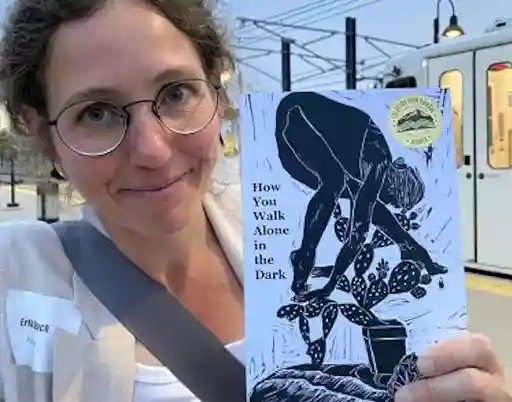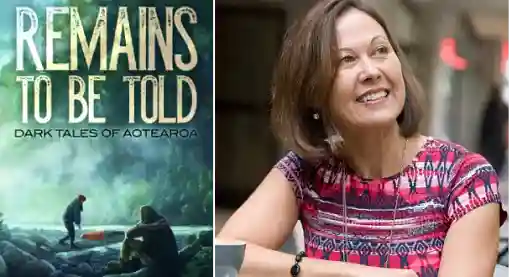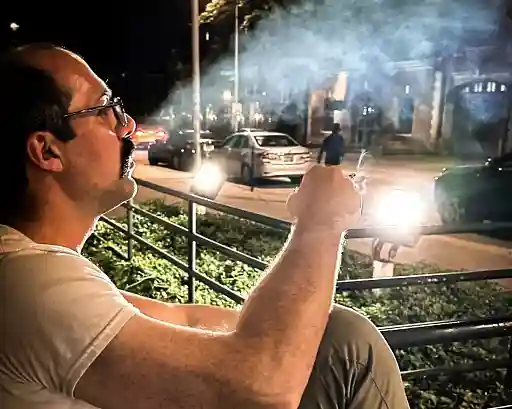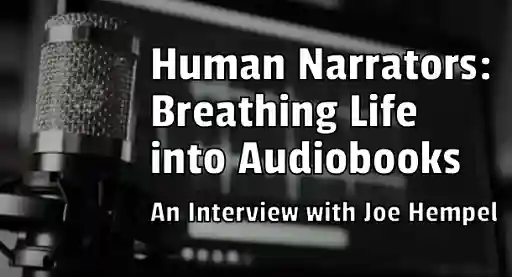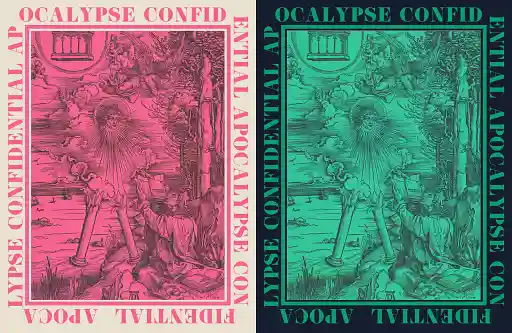Tiffany Scandal first landed on my radar with Jigsaw Youth. I don't even remember how I came across the book. Just that I picked it up and one day after work I was reading it while headed somewhere on the R train, and I got so absorbed I missed my stop. That's the sign of a good book.
So I was thrilled when I found out Scandal had a new book coming out from Eraserhead Press. Shit Luck is a bizarro novella about a girl who goes to a party and dies and then proceeds to have a series of very bad days. I don't want to give too much more away than that (besides what I also give away in the interview). The joy is in the discovery.
And even though Shit Luck feels so completely different from Jigsaw Youth, it also feels remarkably similar—Scandal has a clear, concise voice that is both sharply witty and deeply personal. Plus, I'm a sucker for a second-person narrative, which is hard to pull off, and Scandal nails it, because the very nature of the story calls for it. If you're not familiar with the bizarro genre, Shit Luck might be a good place to start.
Why was a second person narrative necessary for this story?
The concept of the story is so bizarre, it’s the only narrative that made sense in terms of having the reader feel invested in what’s happening. Shit Luck is very much a choose your own adventure story, except all the choices have already been made or removed. Very few people enjoy having their power taken away, and second person narration allows me to take the reader by the hand and tell them all the horrible stuff I have lined up for them.
When you're writing a story in the bizarro genre, how do you strike a balance between the human and the absurd?
I’ve always been into the absurd. Like, my mind just naturally gravitates toward it. But I am also a very empathetic person. When I write, I need to feel what I am trying to convey. If my words can’t evoke some sort of emotional response, then I just assume that my reader will have the same experience. When it comes to writing the absurd, I need to throw in a lot of relatable details to keep the reader’s attention. And because everyone can have a different interpretation of “normal” human experiences, I try to keep them as common as possible. For example, my first book, There's No Happy Ending, it takes place during the apocalypse—something none of us have experienced—but I threw in enough human experiences to make the story relatable to whoever picks up the book.
The book is funny and weird, but also feels very personal—are you working through some of your own anxieties here, or are you going for something more universal?
No matter how personal my work may feel, my intention has always been to express a voice that other people can relate to. A lot of people think that Jigsaw Youth is my story, but really, I wanted to write a book that would’ve made 17 year-old me not feel so alone. And seeing the reviews come in, I was surprised/happy to see that the book affected people from all across the spectrum.
I knew that it was time for me to try to write something funny because most of my work is usually described as heart-wrenching. I like switching things up.
Speaking of the personal, this posits an afterlife that mashes up reincarnation with multiverse theory. Does that spin off your own beliefs, or was it just a framing device for the story?
Totally just a framing device for the story.
Shit Luck actually started out as a workshop assignment for Bizarro Con. Cody Goodfellow taught a course in Bizarre World Building, and our assignment was to outline a story and build a world for a character who’s already dead. There were a lot of really creative ideas running around in that workshop, but Cody really seemed to dig what I came up with and he ended up using my assignment as an example for the class. By the time my editor heard about it, I guess a few people had advocated for it to be turned into a book. So that’s how Shit Luck came about.
Jigsaw Youth and Shit Luck have a lot in common—your voice is very apparent, and they both have a personal touch. But they're also pretty different, in terms of genre and storytelling devices. Is that on purpose? Are you not interested in conforming to one genre or another?
It is absolutely intentional. From the beginning, I knew I wanted to write for different genres. I didn't want to give anyone the chance to pigeonhole me, because I knew that once I was pegged as a certain type of writer, it would be difficult to write something different and have it be received well. But now that I have three books under my belt, I do wonder how different my writing career would be if I stuck to a particular genre. My hope is that people see that I have many talents, and that I don’t come off as a person who’s doing a terrible job at spinning multiple plates.
They're also both under 200 pages. Do you prefer the novella format?
As a reader, yes. They’re easier to pick up and commit to, especially when you feel like you’re constantly on the go. As a writer, I think everyone aspires to write some epic tome, but I’m just not there yet. Prior to having my first novella published, I had only written poetry, short stories, and college essays. I didn’t think I had the attention span to write anything longer. But since I’ve started actively pursuing having my work published, I’ve met a lot of rad people who have helped me grow as a writer. So maybe one day I’ll have a huge book out.
Portland seems like the cool place to live if you're a writer. Do you find the community plays a big role for you, or is more just icing—a nice thing to have but you don't really need it?
Community is key. I feel fortunate to be surrounded by so many wonderfully talented people, and it’s amazing to know that there are constantly amazing events going on. And I wouldn’t be where I’m at today if it wasn’t for this community. I’ll have to admit though, these days, I wish I had more time to enjoy the community. Being a writer, you spend a lot of time alone, in your head. And it’s easy to get lost in your work when you feel the constant pressure of deadlines. But, like you’ve picked up on, Portland has a great community — full of people who understand. We all get busy, but we never forget each other and always make en effort to connect when time allows.
I was recently hanging out with a mutual friend, and we were gossiping, as two guys are wont to do, and I mentioned I had a copy of Shit Luck, and he made an off-hand comment lamenting the amount of unsolicited dick-pics you receive. Is the writing community that full of shitbirds?
The “shitbirds” are everywhere. Hahaha. Prior to pursuing getting published, I was heavily involved with the Suicide Girls community. Being a woman who voluntarily posed nude in photographs AND photographed other women for the site, receiving unsolicited photos and graphic solicitations for sex just kind of came with the territory. You learn to ignore it because most times, these people are just grabbing at straws, sending whatever they have to whoever happens to be online, waiting for some sort of response. I ain’t got time for that shit. If I respond in a negative manner, that could open a door for a potential troll, jumping on every opportunity to unload an arsenal of derogatory terms. I respond in a not-negative manner, it’s assumed I’m interested when I’m not. There’s just no winning here. At least in the writing community, anyone who’s really taken the time to follow me, knows who my partner is and knows that I keep company with some pretty intimidating dudes.
Speaking of the writing community—there've been a lot of conversations lately about things like consent and representation. Male writers are being outed for shitty behavior. Do you feel like things are improving as people are giving more attention and import to these subjects? Or no?
Absolutely. These conversations are super important. If anything, they help promote awareness, which, in turn, leads to safer environments for everyone in attendance. There was a writer’s conference I went to a while back, where some guy got stupid drunk and vented to guys he barely knew about how “fucked up” it was that I brought my partner (who is also a writer) with me. He apparently had it in his head that because I’m a Suicide Girl, I should’ve been available as a party favor to whoever wanted. The guys he vented to shut him down pretty quick, letting him know that the conference really isn’t a place for hooking up, and no matter who I was or what I was involved in, his comments were incredibly disrespectful and not appropriate. Conversations were had around this guy’s behavior, and since, that conference now sends out a disclaimer/rules of conduct email to every attendee (which also includes information on what to do if you feel targeted/uncomfortable in any way).
Is it annoying to have to answer questions like these? The reason I'm asking about this stuff is because of the dick-pic comment, and also because fellow Portland writer Chelsea Cain left Twitter because of trolls. And I figure: This could be an interesting conversation about sexism, but I also realize you might be thinking: Why can't this asshole just focus on the work? This is a long way of asking: Do you feel like these conversations are important, or do you feel like it distracts from what you're doing, when you're made to be a spokesperson for your gender?
Not at all. I actually enjoy having these conversations. I was reading up on Chelsea Cain, and while I don’t have anywhere near the same level of recognition she has, I could sympathize with a lot of what she has experienced. Anytime I post anything that hints at a feminist view, or the fact that English wasn’t my first language, or an opinion on anything, it’s always funny to see my number of followers go down. It’s never by a significant number — I just assume it’s people who showed up for sexy photos and are turned off by the concept of a person with substance.
Since I’ve been published, I’ve been trying to find a balance between my involvement with Suicide Girls and writing. And it’s not that easy. I joined Suicide Girls because I saw a community that empowered women. I feel that women should celebrate their bodies and sexualities and show the world that they are not afraid or ashamed of the skin that they’re in. And I’ve met a lot of very intelligent women through this community. Inspiring people and some of the very best friends I could ask for. But for some distant outsiders, us having an opinion doesn’t fit the idea they have that we should just be “hot and dumb.” Because of my modeling, some people expect my writing to be terrible and won’t give my work a chance, thinking that my looks are what have gotten me this far. But a few people see past all of that. They see and accept that I’m not dumb and that I’m very passionate about whatever it is I pursue. And those people will always have a special place in my heart.
What have you got coming up next?
I’m currently editing a few short stories for a variety of potential publications. Soon, I’m going to take a jab at writing a crime novel. At some point, a break would be nice, but who am I kidding?

About the author
Rob Hart is the class director at LitReactor. His latest novel, The Paradox Hotel, will be released on Feb. 22 by Ballantine. He also wrote The Warehouse, which sold in more than 20 languages and was optioned for film by Ron Howard. Other titles include the Ash McKenna crime series, the short story collection Take-Out, and Scott Free with James Patterson. Find more at www.robwhart.com.
